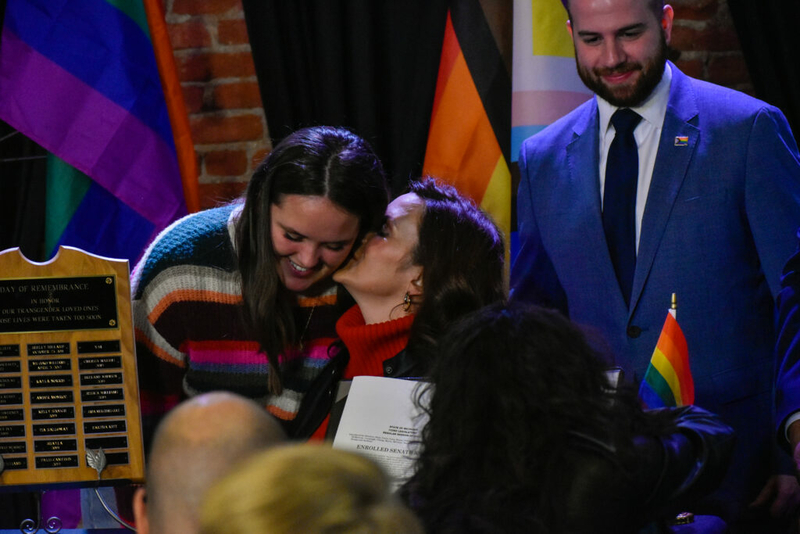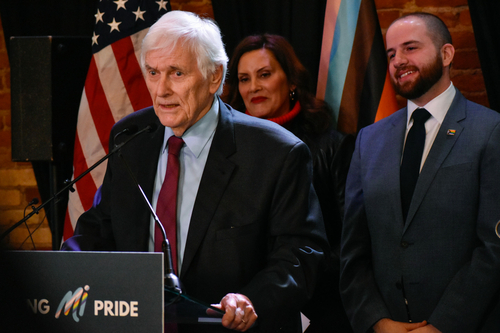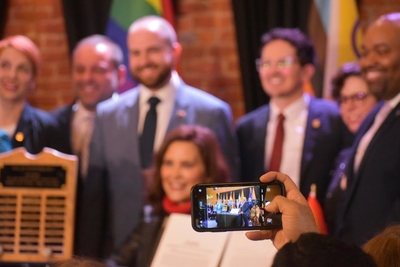Whitmer signs LGBTQ+ non-discrimination bill into law alongside civil rights pioneer Mel Larsen

In a historic and profound moment for LGBTQ+ rights in Michigan, Gov. Gretchen Whitmer on Thursday signed legislation to expand a nearly 50-year-old civil rights law to encompass protections for LGBTQ+ Michiganders.
Whitmer put her signature to Senate Bill 4 — which expands the 1976 Elliott-Larsen Civil Rights Act (ELCRA) to protect against discrimination based on gender identity or sexual orientation — in Lansing alongside LGBTQ+ leaders, officials and lawmakers and one of the two original cosponsors of ELCRA.
“This moment is so long overdue, and too many suffered on the journey to get here,” said state Sen. Jeremy Moss (D-Southfield), sponsor of SB 4. “But … turns out they were waiting for us. They were waiting for a Legislature with the courage to stand up to hate and stand up for equality. They were waiting for members of our own community to tell our story in the chambers of the State Capitol.
“And they were waiting for a governor like Gretchen Whitmer to sign [this bill].”
That came after many Republicans, led by GOP gubernatorial nominee Tudor Dixon, ran against LGBTQ+ rights in the 2022 election. After proposing book bans and a Florida-style “Don’t Say Gay” law for schools, Dixon lost to Whitmer by 11 points. Democrats also won control of both the House and Senate for the first time in nearly 40 years.
SB 4 was adopted 23-15 in the Senate on March 1, with three Republicans joining their Democratic colleagues in the vote, The bill then made its final passage in the House on March 8 with a vote of 64-45 and eight Republicans voting in favor of the bill.
Advocates have sought to enshrine LGBTQ+ rights in ELCRA since its enactment in 1976. The first Michigan lawmaker to introduce a bill attempting to do so was the late state Rep. Jim Dressel, a West Michigan Republican, in 1984.
“And for 40 long years, amending Elliott-Larsen has been the battle cry of our community,” Moss said.

Former state Rep. Melvin Larsen, co-sponsor of ELCRA along with the late Democratic former state Rep. Daisy Elliott, was present at the Lansing event to speak in support of the expansion Thursday. He received a standing ovation from the crowd.
“If you go back to the original Civil Rights Act, between Daisy [Elliott] and myself, the original intent was and still is that every citizen has the right to be protected under the Elliott-Larsen Civil Rights Act,” Larsen said.
“[Elliott] carried that bill around for almost five years because her leadership said to her that she had to have a Republican before she could introduce it. Of course, no Republican wanted to do it till I came along,” said the 86-year-old.
Larsen repeatedly praised Elliott’s lifelong work as a Detroit civil rights leader. She died in 2015 at the age of 98.
In 2020, Whitmer renamed a state building in honor of Larsen and Elliott.
“We’re … well aware that court decisions can change depending on the composition of the jurists. They can change at any time, and the LGBTQ community deserves to — at long last — see the words ‘sexual orientation, gender identity and expression’ printed in black and white in our statutes,” said Attorney General Dana Nessel, the state’s first openly gay official elected to a top statewide office.
“[Opponents of expanding ELCRA] are mad, but you know, it didn’t even bother me because I knew it’s a new day in Michigan,” said state Rep. Jason Hoskins (D-Southfield), sponsor of the House version of SB 4. “So they can either get on board, or they can stay mad.”
While talking to reporters after the signing, Moss told the Advance that it is significant that Larsen himself debunked the Republican line that LGBTQ+ protections were not intended to be added in the original legislation.
“This is meaningful for us to have the [co-]author of this act give credence to this moment,” Moss said. “I’ve heard so much garbage on the other side, but one of the speeches in the House that truly boggled my mind was a legislator who said this ‘was not the intention of the act.’
“Well, Mel Larson says it is. And he trumps whatever they have to say,” Moss said.
He added that expanding Elliott-Larsen is just the first step to protecting the LGBTQ+ community.
“This is the most foundational aspect for justice to our community, but there are so many other things that we can build from here — banning conversion therapy, strengthening our hate crimes statute, cleaning up unconstitutional language dealing with marriage,” Moss said.































